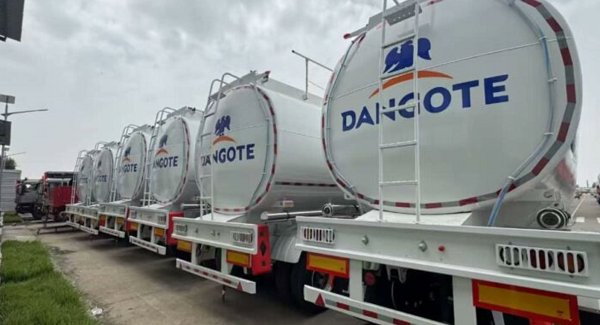Dangote Petroleum Refinery unveiled an ambitious plan to deploy 4,000 Compressed Natural Gas (CNG)-powered tankers to distribute Premium Motor Spirit (PMS) and diesel across Nigeria, with operations set to commence on August 15, 2025. This initiative, described as a game-changer for the nation’s energy sector, aims to enhance efficiency, reduce logistics costs, and promote sustainable fuel distribution. The refinery’s announcement, made during a press conference in Lagos, underscores its commitment to addressing longstanding challenges in Nigeria’s downstream petroleum industry.
The deployment of these CNG tankers is part of a broader strategy to streamline fuel supply chains and ensure nationwide coverage. Each tanker is designed to meet international safety and environmental standards, equipped with advanced technology to minimize emissions and optimize fuel delivery. By leveraging CNG, a cleaner and more cost-effective alternative to traditional fuels, Dangote aims to reduce the carbon footprint of its logistics operations while lowering operational costs for end-users.
A key highlight of the initiative is the provision of free logistics services for major users, including independent marketers, petrol dealers, manufacturers, telecommunications companies, and aviation firms. This move is expected to alleviate the financial burden of transportation costs, which have historically driven up fuel prices in Nigeria. The refinery’s leadership emphasized that this cost-saving measure will stabilize fuel prices and enhance affordability for consumers and businesses alike.
To support the tanker fleet, Dangote Refinery is investing heavily in infrastructure, including the construction of CNG booster stations strategically located across Nigeria’s six geopolitical zones. These stations will ensure a steady supply of CNG to power the tankers, reducing downtime and enhancing operational efficiency. Additionally, the refinery plans to deploy an auxiliary fleet of over 100 CNG-powered tankers to provide backup support during peak demand periods.
The initiative aligns with Nigeria’s national agenda to transition to cleaner energy sources, as outlined in the federal government’s Decade of Gas program. By adopting CNG, Dangote Refinery is contributing to the reduction of greenhouse gas emissions and promoting environmental sustainability. The refinery’s adoption of CNG also sets a precedent for other players in the energy sector to invest in eco-friendly technologies.
Dangote Refinery’s management has assured stakeholders that the 4,000 tankers will be rolled out in phases, with 1,500 units operational by the end of 2025 and the remaining units deployed by mid-2026. This phased approach will allow for rigorous testing and quality assurance to ensure the fleet meets regulatory requirements. The refinery has partnered with leading global manufacturers to produce the tankers, ensuring durability and compliance with Nigeria’s road safety standards.
The announcement has been met with widespread optimism from industry stakeholders, who see it as a solution to Nigeria’s chronic fuel distribution challenges. Independent marketers, in particular, have praised the free logistics offer, noting that it will enhance their profit margins and enable them to offer competitive prices to consumers. The Nigerian National Petroleum Corporation (NNPC) has also expressed support, describing the initiative as a critical step toward achieving energy security.
Beyond fuel distribution, the initiative is expected to create significant economic benefits, including job creation and skills development. The construction and operation of CNG booster stations will generate employment opportunities for engineers, technicians, and support staff. Additionally, the refinery plans to train local drivers and mechanics to maintain the CNG tankers, fostering capacity building in Nigeria’s energy sector.
The project is not without challenges, however, as Nigeria’s road infrastructure remains a concern for large-scale logistics operations. Dangote Refinery has acknowledged this issue and is collaborating with federal and state governments to improve key transportation routes. The refinery is also investing in real-time tracking systems to monitor the tankers, ensuring timely deliveries and minimizing risks associated with road transport.
In addition to the tanker deployment, Dangote Refinery is expanding its production capacity to meet growing demand for PMS and diesel. The refinery, which began commercial operations in 2024, has a capacity of 650,000 barrels per day, making it Africa’s largest single-train refinery. Its ability to produce high-quality, Euro-V compliant fuels positions it as a critical player in Nigeria’s quest for energy self-sufficiency.
The initiative also has implications for Nigeria’s foreign exchange reserves, as increased domestic refining capacity reduces reliance on imported petroleum products. By distributing locally refined PMS and diesel, Dangote Refinery is helping to conserve foreign currency and strengthen the naira. This aligns with the Central Bank of Nigeria’s efforts to stabilize the economy and promote local production.
Stakeholders have called for transparency in the implementation of the free logistics program to ensure that benefits reach intended recipients. Dangote Refinery has responded by establishing a dedicated monitoring unit to oversee the distribution process and address any concerns from marketers and consumers. The refinery has also pledged to engage with community leaders to ensure that the initiative supports local economies.




